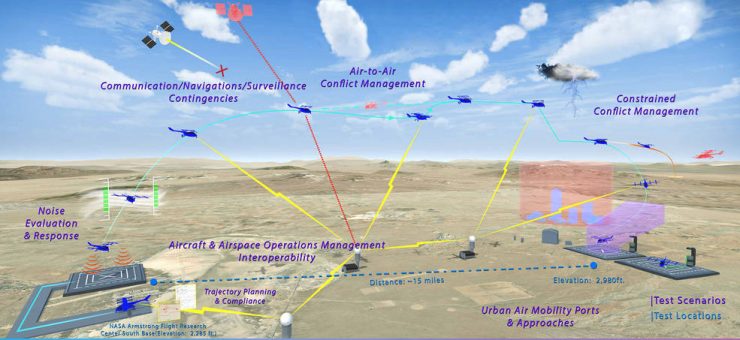The University of North Texas is leading a team of academic and industry experts selected by the US National Aeronautics and Space Administration (NASA) to test the capabilities and readiness of vehicles and systems to support mobility in and around densely populated metropolitan areas.
“Our team is developing the Resilient Air Space Operations and Services (RASOS) platform which will allow low-flying traffic, both manned and unmanned, to receive data from multiple sources, sense their surroundings and automatically share information about airspace hazards with each other,” said team lead Kamesh Namuduri, electrical engineering professor with the College of Engineering. “Airspace hazards include sudden weather changes, sensor failures, or communication infrastructure failures. Sharing of such time-critical information is necessary to avoid potential accidents in the air, especially when traffic increases as expected.”
NASA has selected a total of 11 teams to work on its Advanced Air Mobility National Campaign.
Campaign participants will demonstrate integrated operations in real life scenarios including: use of two-way network flight plan communications; beyond visual line of sight operations; real and simulated vehicle and operations emergency contingencies; dynamic traffic avoidance and trajectory management; and approach and landing in the presence of structures and associated mechanical turbulence.
“We have reached the point where low-flying traffic must be managed not just by people, but by the drones and vehicles themselves,” Namuduri said. “It is no longer as simple as an operator on the ground maintaining line-of-sight contact with a drone. We are moving into a time when drones must be able to operate within a system of traffic rules, collect information from multiple sources and make decisions on the best and safest way to operate. ”
The RASOS team includes three universities and four private companies:
- The University of North Texas, Denton, Texas – UNT will maintain overall responsibility for the project and provide the integrated service architecture (communications and data support);
- The Lone Star Unmanned Aircraft System Center of Excellence at Texas A&M University, Corpus Christi, Texas – LSUASC will support simulation and data collection activities;
- The Center for Collaborative Adaptive Sensing of the Atmosphere at the University of Massachusetts, Amherst – CASA will lead the design and development of weather alerting services for the overall system;
- OneSky of Exton, Pennsylvania – OneSky brings more than 30 years of aerospace software development to the project and will work on traffic management issues;
- ResilienX, Inc. of Syracuse, New York – ResilienX will lead the design and development of the Health and Integrity Monitoring system for the overall UAM ecosystem;
- Unmanned Experts Inc. of Denver, Colorado – Unmanned Experts will create a deployable unmanned traffic management system specifically for use in wildfire operations;
- Frequentis USA, Inc. of Columbia, Maryland –Frequentis is a supplier of communication and information systems for control centers including solutions for managing manned and unmanned air traffic. Frequentis will contribute its Flight Information Management System for this project.
The University Center for Integrated Intelligent Mobility Systems is a new collaborative centre that will bring researchers and manufacturers together to accelerate rural and urban development of affordable and safe intelligent mobility systems, such as the one being developed by the Resilient Air Space Operations and Services team.
(Image: NASA)
For more information visit:
https://www.nasa.gov/aamnationalcampaign
https://news.unt.edu/news-releases/unt-led-team-collaborates-nasa-advanced-air-mobility-project




